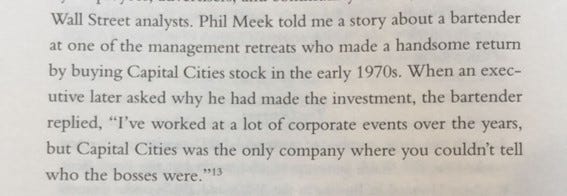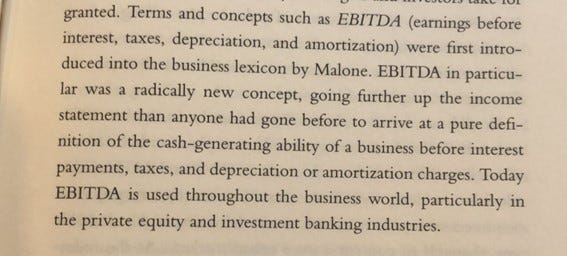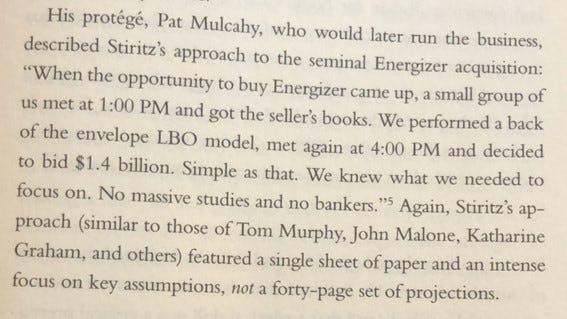I cannot imagine a world in which learning from others is the incorrect path to take. The Outsiders is a book that contains the story of eight different business managers. Although very well-known and covered, there are things I had never heard of before. One would think that, because of how many times they’ve listened to or read about this book, they know it. I suspect there might exist a bias of this sort.
The problem is that what mostly gets shared from books and articles is their theses. But highly value-additive, knowledge-consolidating and ideas-generating insights are in the details. That is the reason why I recur to sources. Summaries are close to useless in my opinion. Reaching different conclusions with widely spread premises doesn’t seem plausible.
I’m seeking intellectual detours. Roads that are not crowded. I think this is the best path forward. The one that will make my signals be as different and high quality as possible. In this line are the ideas I’ll try to share with you. On this occasion, snippets from The Outsiders that illustrate the importance of independent mindedness and confidence in one’s judgment.
“You are not right because others agree with you, but because your facts and reasoning are sound” Benjamin Graham
Time Allocation
Our time is the most valuable asset we have. The cost of time tends to infinite because of the extraordinary outcomes that can be achieved if employed correctly. It is therefore fundamental to assess its allocation. Henry Singleton, the most fascinating character of this book, approached time allocation in a radically different manner than most. He didn’t plan ahead of time, which might be seen as a mistake. I think Henry followed Charlie’s advice:
“There’s an old two-part rule that often works wonders in business, science, and elsewhere:
Take a simple, basic idea
Take it very seriously”
Analyzing Situations
We mostly live on autopilot. In business, and in life, a continuous system 2 approach does not work. Unlike nature, Man is not only an excellent tinkerer, but also a divine artificer. We can create and improve things, but we can also destroy them.
Time should always be taken to consider the basics of why we are doing something. When Singleton stopped and analyzed Packard Bell, he noticed that it had a permanent competitive disadvantage. Henry immediately ceased operations afterwards. Competitors, however, lived on autopilot. It was not until they got punched in the face that they noticed what was occurring.
Distaste for Public Status
Tom Murphy and Dan Burke led Capital Cities. Similar to the other Outsiders, the corporate approach they took was completely decentralized. What is curious, nonetheless, is that not only did they make this decision to maximize shareholder value, but it also seems to reflect a deeper characteristic of these unusual people. They do not seek public attention, but rather do things for the sake of them. It’s an authentic joy of exercising the task what seems to motivate them.
Stepping Outside their Discipline
In accordance with Munger’s epiphany of looking into other professional’s disciplines, this sort of people tends to find no intellectual boundary. It appears as if their duty is to re-think everything. John Malone, figuring out there was no good metric to reflect what he intended, simply created a new one.
Simplicity
A recurrent trait that I just keep encountering, one with which Charlie was obsessed. Perhaps undoubtedly, simplicity is the final destination of all verticals of thought. It must, nonetheless, be earned. Good simplicity is the one that covers infinite complexity. If practiced without its earning, ordinary results are to be expected. Stiritz, like Buffett, got to a state where he only needed a few inputs, a couple of hours, a pen and paper to make big decisions.
Disregard of Common Practices
Naturally, normal behavior leads to normal results. Only a handful of businesses end up being exceptional. This being the case forces managers to think for themselves through best practices. Warren Buffett ended up with an outrageously atypical system, only achievable by reasoning.
Personal Commentary
Superbly interesting book. This article reminds me of my debt to you. I haven’t yet written about Mark Leonard after I read his letters back in November. His management style and practices incredibly resemble that of The Outsiders. I will try to come up with something interesting.
On other news, I’ll be publishing Microsoft’s earnings review tomorrow and the first part of Burford’s research on Wednesday
Looking for a Job
I will be graduating from my Master’s at Brandeis, in Boston, in May and am looking for a position as an equity analyst. If you know of anything, in any city, I’d appreciate you letting me know. Also open to private equity and venture capital.
Contact: giulianomana@0to1stockmarket.com








Nice article once again. Good luck with your job search!